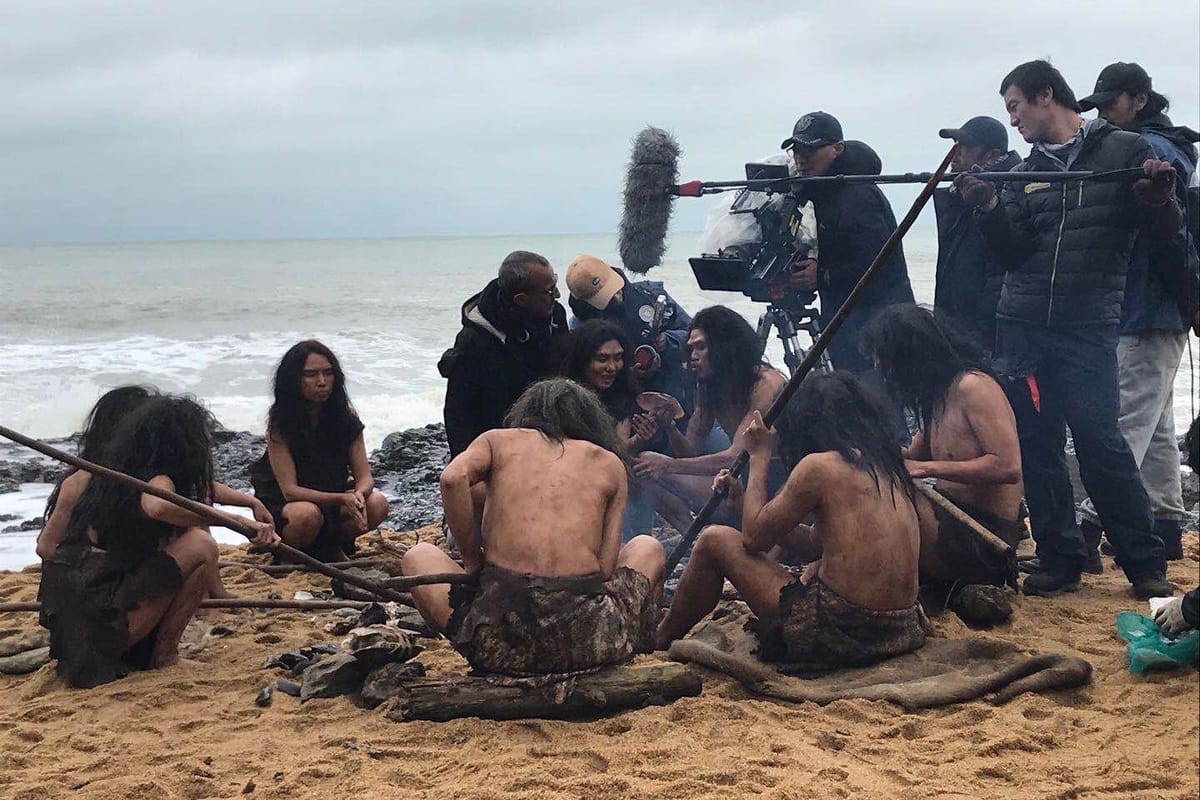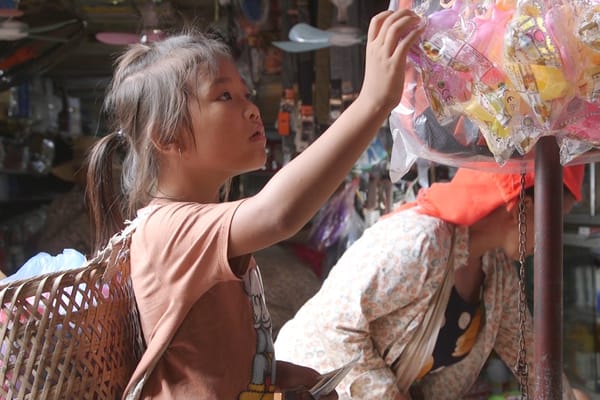Pekingman Shoot: Living Proof That China Co-production Still Exists

In addition to a rare pandemic-era China co-production, Streamlined takes a brief look at Asghar Farhadi’s legal woes and the controversial restructure of India’s film-related public bodies.
1. Sino-French co-production Pekingman wraps in China
Earlier this week, Streamlined caught up with Shanghai-based producer Natacha Devillers, currently in lockdown as the city battles Covid, which meant she had time to discuss the China-France co-production she recently wrapped, docu-fiction Pekingman: The Latest Secrets Of Humankind, directed by France’s Jacques Malaterre.
Co-produced by France Television and Chinese broadcaster CCTV, the feature-length production filmed from February 14 to March 22 in the midst of Chinese New Year, the Beijing Winter Olympics and a never-ending pandemic. While this was by no means an easy feat, it does prove that China co-production is still possible and the country is not as hermetically sealed off as it can sometimes appear.
Malaterre, who works with leading palaeontologist Yves Coppens, is an expert in films about prehistory and human evolution, with credits including A Species Odyssey (2003), which still holds the record of highest-rating TV film in France. His new film covers 800,000 years of Chinese pre-history through eight separate stories, a cast of around 100 actors, who were trained to move like early humans, and a whole lot of prosthetics.
Devillers explains that the project had already been delayed for two years when she boarded as executive producer last year. She got the co-production contracts signed over the summer, started scouting locations and by October had got Malaterre into China. Some heads of department were also supposed to travel to China but were put off by the country’s three-week long quarantine requirement.
“The Chinese side did everything they could to get the director in, would have helped with other crew, and supported us all along the way,” says Devillers. “Casting started while the director was still in quarantine, then he later auditioned 300-400 people and narrowed it down to about a hundred. I’d pre-scouted the whole of China and when he got out we went around and ticked off what he wanted.”
The shoot went to three provinces – Hainan, Zhejiang and Hebei – avoiding the Beijing area during the Olympics, and dropping plans to film on an ice lake in Jilin province in the northeast, as Devillers could see the current Covid outbreak looming. Instead, the lake was built in a studio near Hengdian, a major production base in Zhejiang province. She notes that Hainan is also booming as a production base in China during the pandemic: “It has good weather, new infrastructure and because it’s an island is easier to control in terms of Covid management.”

Devillers adds that the Pekingman shoot had a doctor on set at all times and conducted more than 1,200 Covid tests: “We had a great production coordinator and production manager who kept us on top of every location. We could only have 50 people on set maximum [n.b. this is considered a small crew in China], so you just comply and stay safe and operate in a closed loop as much as possible.”
Currently in post-production in Paris, the film was being introduced to buyers at this week’s MipTV (April 4-6) by French sales agent Federation. Devillers is now working on another co-production that she hopes will shoot in China next year: “China’s not closed to everything so it’s just a question of finding the projects that can still work for both sides.”
2. Asghar Farhadi alleged plagiarism sent to trial in Iran
Judging by reactions on social media, the Asian film biz moved swiftly on from the Oscars slapping incident to express disappointment over two other potential fallen angels this week – Japanese director Sion Sono on sexual harassment charges (see below) and Iranian auteur Asghar Farhadi in a case of alleged plagiarism. Of the two, the Farhadi case – in which one of his students, Azadeh Masihzadeh, is claiming he stole the idea for A Hero from her documentary All Winners, All Losers – looks much less clear-cut.
After reports surfaced earlier this week that Farhadi had been found guilty of plagiarism by an Iranian court, Farhadi’s lawyer rushed out a statement to say that the court proceedings so far were “not the final verdict”, and the case will now be heard “in the second criminal court and then in the appellate court”. Alexandre Mallet-Guy, of the film’s co-producer and sales agent, Paris-based Memento, also issued a statement expressing his confidence that the court will find in favour of Farhadi.
Farhadi’s defence appears to rest on the fact that the real-life story that inspired A Hero (of a former prisoner who finds a bag of gold and returns it to its rightful owner despite badly needing the money himself) was in the public domain as it was disclosed in press articles and TV reports years before Masihzadeh’s documentary was released.
This may be true, but it’s not a defence that is finding much support among industry figures, who are asking why he didn’t just give Masihzadeh a credit, for at least bringing the story to his attention or helping make it more accessible, and why he reacted to the accusations by suing her for defamation.
There’s often a huge gap between what older, powerful filmmakers are legally allowed to do and what is considered fair play and being decent. But whatever the court’s decision, suing a young woman in Iran is not a good look and the negative publicity is already substantial. Perhaps the best we can hope for is that, as a result of this case, mentors are more careful in their dealings with film students in the future.
3. India merges public film bodies into NFDC
This story has been rumbling along in India for some time, but last week became official – four of India’s film-related public bodies were folded into the National Film Development Corporation (NFDC), an entity under the Ministry of Information & Broadcasting (I&B) that is expected to act like a company and be financially self-sustaining. The NFDC has a mandate to finance, produce and distribute films across India’s many languages and launched the Film Bazaar industry platform in 2007.
The merger, which was first announced at the end of 2020, followed an investigation by a committee headed by former I&B secretary Bimal Julka. It proved controversial with the local film industry, with more than 1,000 actors, filmmakers and other film professionals signing a letter sent to the I&B ministry opposing the move. Signatories included actor Naseeruddin Shah, filmmaker and actor Nandita Das, director Anand Patwardhan and lyricist Varun Grover.
The four film public film bodies being folded into the NFDC are:
- Films Division (FD) – established in 1948 with a mandate to produce public service films, newsreels, short films and documentaries. Production of documentaries has now been transferred to the NFDC, although the brand “Films Division” will be kept as a production vertical under NFDC.
- Directorate of Film Festivals (DFF) – established in 1973 and responsible for organising the International Film Festival of India (IFFI), Mumbai International Film Festival (not be confused with MAMI’s Mumbai Film Festival) and the Children’s Film Festival. It will now be part of the NFDC’s promotion vertical.
- National Film Archives of India (NFAI) – established in 1964 and responsible for film preservation.
- Children’s Film Society of India (CFSI) – established in 1955 to produce children’s films and make them accessible to under-privileged children in rural areas.
The government claims the process will eliminate overlap of activities and ensure “better utilisation of public resources”. In a statement issued by India’s Press Information Bureau, the government also mentioned the introduction of “financial incentives for audiovisual co-productions with foreign countries and for promotion of shooting of foreign films in India”, to be overseen by the NFDC’s Film Facilitation Office (FFO). India has been talking about incentives for several years, but so far nothing has materialised.
Meanwhile, the local film industry claims that the merger decision was reached without consultation with “primary stakeholders”…including “members of the film fraternity and employees of the above-mentioned institutions”. Industry figures are also concerned about further privatisation of public film bodies and the merger of activities such as film preservation, which can be expensive but not necessarily profitable, with a corporation.
The ministry has a point that some of these institutions are not fulfilling their mandate. DFF for example has never managed to transform IFFI, which takes place in Goa in November, into a top-tier international film festival. But then few of these bodies have ever been properly funded. Streamlined will be tracking this development in coming months, hopefully speaking to people on both side of the debate, to see how it unfolds.
LAB & FUNDING NEWS:
- Full Circle Lab Philippines announced the 15 projects that will take part in its fourth edition, scheduled as a physical event in Cebu (April 26-30), followed by online sessions until September 2022. Organised by Matthieu Darras’ Tatino Films with the Film Development Council of the Philippines (FDCP), the event comprises a Fiction Lab, First Cut Lab, Creative Producers Lab and Story Editors Lab. The three projects selected for the First Cut Lab include Malaysian filmmaker Woo Ming Jin’s Stone Turtle; Singapore-based filmmaker He Shuming’s Ajoomma, produced by Anthony Chen; and Where Is The Lie?, from the Philippines’ Quark Henares.

IN DEVELOPMENT:
- Deadline reported in an exclusive that Indonesia’s Joko Anwar (Impetigore) is attached to direct Fritzchen, an adaptation of a short story by Charles Beaumont, for Village Roadshow. Michael Voyer is adapting the sci-fi horror story, about a boy’s encounter with a strange creature on the beach, with David Kopple producing for Entertainment 360.
- Speaking during a session at MipTV, Squid Game creator Hwang Dong-hyuk revealed that he’s developing a film called Killing Old People Club, based on a novel by Italian author Umberto Eco, which he claims will be “more violent than Squid Game”. He’s also working on a second season of Squid Game, which he hopes will stream on Netflix by the end of 2024.
- Variety had an exclusive about US-based Vietnam-born screenwriter Vincent Ngo setting up a comedy series Early Risers in Vietnam. Produced by Early Risers Media Group, which is repped by CAA, the show is about a group of expats in Saigon. Zach Merck will direct a multinational cast. This is the second high-profile series set amongst expats in Asia following Amazon’s Expats, which ran into controversy while shooting in Hong Kong when star and executive producer Nicole Kidman bypassed the city’s strict quarantine requirements. Streamlined can claim some authority on the subject of expats in Asia. We’re really not that interesting.
CORPORATE:
- Korea’s CJ ENM is launching a new production venture, CJ ENM Studios, specialising in content production for OTT platforms in Korea and worldwide. Yong Soo Ha, former executive vice president of CJ ENM’s business development & investment team, has been appointed CEO of the venture, which will produce a wide spectrum of genres across series and films. CJ ENM’s production stable also includes leading drama producer Studio Dragon (Crash Landing On You) and Endeavor Content.
CANCELLED:
- Japan is having its #MeToo moment with maverick director Sion Sono joining actor Kinoshita Houka and director Sakaki Hideo in being accused of sexual harassment by multiple Japanese actresses. As Sono is best known for raunchy indie films such as Love Exposure (2008), about a young man who indulges in up-skirting, the clues to his behaviour may have been there all along, but has still resulted in outpourings of shock and disappointment from his (admittedly mostly male) fanbase.
CURATED:
- Sydney Film Festival announced a batch of 22 films for this year’s edition, which will take place as an in-person event (June 8-19). The line-up includes Australian titles Sissy, directed by Hannah Barlow and Kane Senes, Macario De Souza’s 6 Festivals, Luke Cornish’s Keep Stepping and David Easteal’s docudrama The Plains, which played at Rotterdam. The festival took place as an online event in 2020, and was held in-person last year, but postponed to November.
SOLD:
- Endeavor Content has sold eight-part crime drama Tokyo Vice to Starzplay for the UK, Ireland and German-speaking Europe, OSN Plus for the Middle East and North Africa, Crave for Canada, Canal Plus for France and Paramount+ for Australia. Produced by HBO and Japan’s Wowow, the series was created and written by J.T. Rogers and has a pilot episode directed by Michael Mann. The cast includes Ken Watanabe and Rinko Kikuchi. It will go out on HBO Max across the streamer’s territories in Latin America and Europe, and HBO Go in Southeast Asia, Taiwan and Hong Kong.
- Screendaily reported in an exclusive that M-Appeal has sold Berlin competition title Return To Dust, directed by China’s Li Ruijun, to North America (Film Movement), Japan (Moviola), Italy (Tucker Film), Czech Republic & Slovakia (Film Europe) and Middle East & North Africa (Moving Turtle). The film had previously been sold to string of other territories. That’s not a bad run for sales on an independent Chinese film recently.
STREAMING UPDATES:
- Hollywood Reporter had an exclusive on an as-yet-untitled crime series that Thai Filmmaker Banjong Pisanthanakun (The Medium, Pee Mak) is writing and directing for Amazon Prime Video. Inspired by the hunt for one of Thailand’s most notorious serial killers, the eight-hour series will be executive produced by Banjong and Conor Zorn through production company Little River Entertainment.
- Paramount+ has ordered Australian drama Paper Dolls, about a fictional girl band Indigo, which Australia’s Helium Pictures will produce for Paramount+ Australia and Network 10. Inspired by the true-life story of Australian girl group Bardot, the eight-hour series is created and written by Ainslie Clouston (Amazing Grace), who developed the show with Claire Phillips (Playing For Keeps). Production is expected to start in Sydney later this year.
- India’s Zee5 Global will premiere feature film Forensic, a psychological thriller directed by Vishal Furia (Criminal Justice) and starring Radhika Apte and Vikrant Massey. Produced by Mini Films and Soham Rockstar Entertainment, the film is a Hindi-language remake of the 2020 Malayalam-language film of the same name.
- Two of Malaysia’s leading film producers, Astro Shaw and Skop Productions, announced what they described as “their debut into premium series”, Kuasa, about an entertainment mogul and the three children who are in line to inherit his legacy. Directed by Kroll Azry (Black), the series premieres on April 11 on Astro Citra and will also be streamed on Astro Go and On Demand.
That’s all for this week…next week Streamlined will take a look at the Cannes film festival line-up announcement on April 14.




